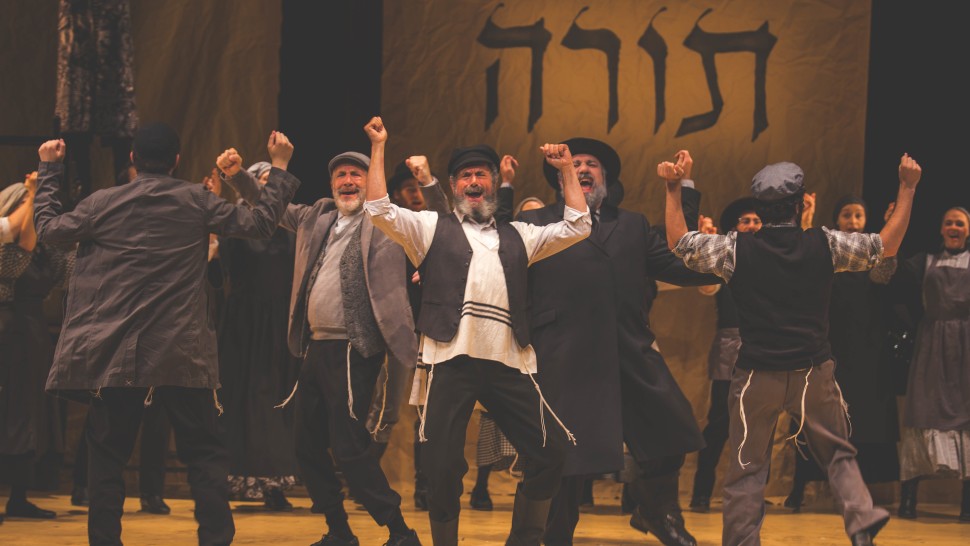If I could reverse things, Joel Grey’s Yiddish “Fiddler on the Roof,” off Broadway at Theater 42 next to Playwrights Horizons, would be on Broadway and winner of the Tony for Best Revival of a Musical. Daniel Fish’s stripped down “Oklahoma,” now at the Circle in the Square, would be somewhere else.
But I cannot control the theater world, much as I’d like to. Joel Grey is a Broadway star Capital S, Tony winner, Oscar winner, known for “Cabaret,” among other things. He’s the most likeable guy you could meet for a legend. Who knew he’d direct the most moving version of “Fiddler on the Roof” to come along in eons? His Yiddish language version is a delight, a treat, a surprise since we just had a big “Fiddler” with Danny Burstein and Jessica Hecht that won awards and was quite good.
Even if you don’t know Yiddish (which is, really everyone) except for a few stock phrases, this “Fiddler” is a revelation. It’s intimate, for one thing, but also relaxed, organic, and full of soul. There are subtitles running the whole time, but the cast is so emotive and expressive, you almost don’t need them. You know what’s going on. The amazing thing is that Joe Stein’s book is laid out word for word in the subtitles and you realize what genius it is. There isn’t a false note in the story Tevye and his family’s displacement from the Ukraine in 1910. The diaspora is so timely considering immigration crises around the world. Change the language to Spanish, Syrian, etc and it’s the same story.
After a while, you actually forget the cast is speaking Yiddish (although some are speaking Russian, which is close enough). The simplicity of the staging and the integration of Jerome Robbins’ choreography make for a breathtaking mix. It doesn’t hurt that Golde and Tevye, our main characters, are played with sublime economy by Steven Skybell and Jennifer Babiak. Jackie Hoffman is a surprisingly straightforward Yente. The whole cast– immersed in a rare but not dead language– seems enthralled, like they can’t believe they’re doing this and it works so well. By the time get to Tevye’s Dream, you’ve given into the whole thing.
So “Fiddler” comes from 1964 and is respected so much that it resonates in 2019 like never before. But “Oklahoma” from 1948 is made by people who seem to hate Rodgers and Hammerstein, musicals, and audiences.
To make “Oklahoma” cutting edge, Fish keeps the house lights on for most of the show at this theater in the round. Why? Because it was so hot and sunny in OK? It’s not OK, it’s unpleasant. Occasionally he turns them off, or stages a conversation or scene in complete darkness. You feel as if you’re being tested to see how much abuse can be ameliorated by wonderful songs.
The answer is: not a lot. The actors, who are very talented, are performing one of the great, big hearted musicals of all time through gritted teeth. The walls of Circle in the Square, by the way, a large oval, are adorned with gun racks full of rifles. Yes, indeedy. The NRA must be buying group allotments of seats. The small, plucky orchestra is on stage, along with the cast, many of whom are involved in food preparation as the show moseys on.
The first act is less objectionable, and sort of proceeds like the first act of “Sunday in the Park with George.” When intermission arrives, you feel you’ve seen it all. What could be left? The Act Two begins — after the audience is invited on stage to try free cups of excellent homemade chili with corn bread. To replace Agnes DeMille’s legendary ballet from the original show, the new production starts with a lone dancer performing a sort of modern dance act to Jimi Hendrix-guitar renditions of the “Oklahoma” songs. This was a bad idea, and ends less rapidly than one might hope.
There’s a lot of affection for the cast, especially Ali Stroker as Ado Annie, who could play a young Dolly Parton in a minute. Even though she’s in a wheelchair, she has the liveliest personality on stage. Will Brill is also a welcome presence as Ali Hakim. The star of the show is Damon Daunno, as Curly, who is very engaging as he plays his guitar and warbles. But Fish has done something fishy to the end of “Oklahoma,” turning Curly into an unsympathetic murderer. In the real story, Curly’s nemesis, Jud Fry (a very good Patrick Vaill), pulls a knife on him, they fight, Jud falls on the knife and dies. In this version, Curly just shoots him dead. There’s a lot of blood. Jud comes off as a victim, Curly as a self-entitled prick.
What’s going on with the Rodgers and Hammerstein estate? Why did they license this? How could they need money? They’ve made a lot of money from Ariana Grande’s use of “My Favorite Things” for a crap top 40 song, But did they need it? They could have said no. And they could have said no here, too. I so wish they had.

